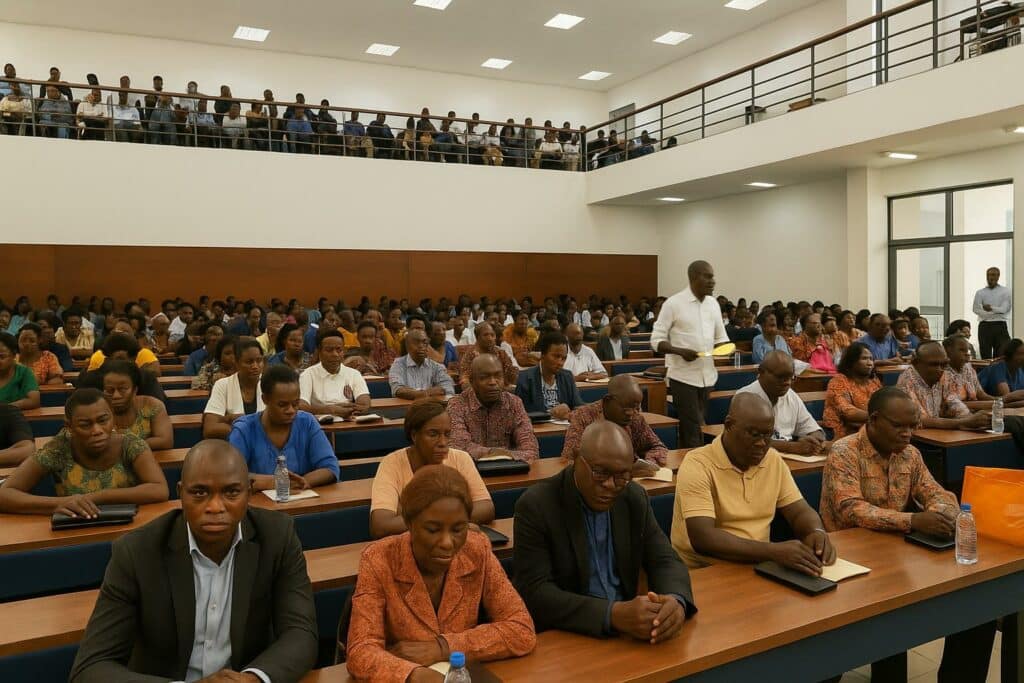Scientific momentum at the University Denis Sassou Nguesso
In the modern amphitheatre overlooking the Congo River at Kintélé, Professor Arnaud Wilfrid Etou Ossibi formally opened the second edition of the Faculty of Applied Sciences’ Scientific Activities Week on 6 October. The dean described the gathering as “a genuine moment of scientific awakening”, designed to complement academic instruction with hands-on exposure to research and technology. By adopting the theme “Applied research at the Faculty of Applied Sciences: sustainable solutions for enterprises and target populations”, the organisers framed the week as a bridge between theory and the urgent needs of Congolese society.
Regional collaboration strengthens applied research in Congo
While the event is rooted in the campus of the University Denis Sassou Nguesso, its reach is resolutely international. Thirty visiting scholars crossed borders to share expertise, including contingents from Benin, Burkina Faso, Gabon and Niger. Their presence gives this fourth overall edition a regional resonance and underscores the Faculty’s ambition to position Kintélé as a hub for Central and West African applied research. The diversity of perspectives promises cross-fertilisation on topics ranging from renewable materials to digital simulation, enriching the methodological toolbox available to local researchers.
Industry–academia nexus for sustainable solutions
Throughout the week students will step out of lecture halls to visit laboratories, public technical administrations and private-sector production sites. Exhibitions of scientific posters sit alongside a contest for the best research-and-development project, encouraging early-stage investigators to refine proposals that could interest investors. The dean stressed that such initiatives nurture a culture in which results are valued not only for their academic merit but also for their capacity to become prototypes, patents or advisory services for companies. In that sense, the programme dovetails with national efforts to diversify the economy by elevating home-grown innovation.
Expert insights echo continental ambitions
The opening ceremony featured two flagship lectures that set a deliberately solution-oriented tone. Professor Jean De Dieu Nzila of the École normale supérieure, Marien Ngouabi University, examined household solid-waste management in the Republic of Congo and outlined research paths toward durable answers. He insisted that urban sanitation in Brazzaville and Pointe-Noire can move from constraint to opportunity if engineers embrace circular-economy principles. Professor Antoine Elimbi of the University of Yaoundé expanded the horizon with a presentation on geopolymer binders as a strategic alternative to traditional cement. According to the Cameroonian scholar, the abundant lateritic soils of Central Africa offer a low-carbon resource base capable of redefining the region’s construction industry.
À retenir
Beyond its scientific allure, the week embodies a pedagogical philosophy that places students at the centre of experimentation and regional networking. The presence of twenty-seven external research institutions, the organisation of a round table on “Science at the heart of the African dream” and the reward system for best communication or logo all converge toward one objective: instilling confidence that local talent can conceive answers adapted to Congolese realities.
Le point juridique et économique
Under Congolese law, universities enjoy academic freedom while operating in a framework that encourages public-private partnerships. The Faculty’s decision to foreground applied research resonates with investment provisions that grant tax incentives to innovation-oriented projects, thereby heightening the commercial viability of patents emerging from campus laboratories. In parallel, waste-management and green-cement themes align with regulatory ambitions to cut urban pollution and lower the carbon footprint of infrastructure, dynamics likely to attract concessional financing from regional development banks.
Anticipating the 11 October finale
The curtain will fall on 11 October, yet the organisers emphasise that research is a continuum rather than a calendar event. Award-winning posters are expected to be uploaded to the university’s open-access repository, and the most promising prototypes will be submitted to the Technology Transfer Office for follow-up. Students returning from industrial site visits will draft reflective reports, a requirement that turns observation into analytic skill. In the words of Professor Etou Ossibi, the week aspires to leave a lasting imprint: “We wanted scientific curiosity to be lived, felt and projected far beyond Kintélé.” His message captures a broader national aspiration: nurturing a generation capable of transforming scientific insight into inclusive growth.

